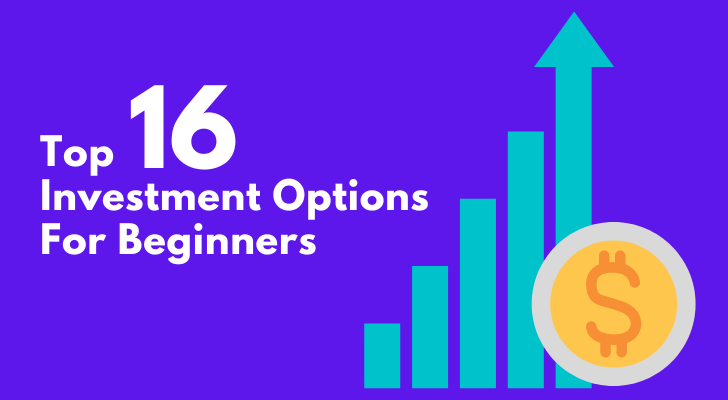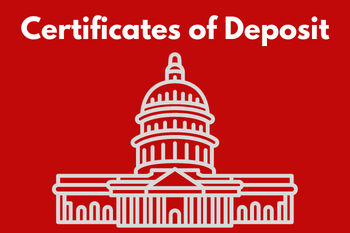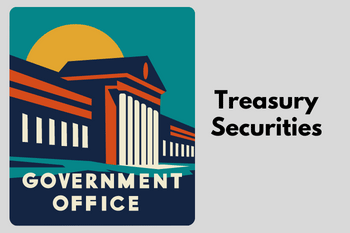It's hard to decide which investment option is right for you when you have some money to save but there are so many options out there. I have put together a list of the top 16 investment options for you, so you can make a careful decision about where to put your money. You have to think about what your goals are, how much risk you're willing to take, and what kinds of investments will best suit your needs.
If you're looking for a short-term investment, you'll want to focus on things that will give you a quick return without taking on too much risk. This could mean investing in stocks that are less volatile or putting your money into a high-yield savings account.
Whereas if you're looking for a long-term investment, you'll want to think about how you can grow your money over time. This could mean investing in stocks or mutual funds with good growth potential, buying real estate, or even starting your own business.
Whether you're looking for a short-term or long-term investment, I've got you covered. Read on to learn more about the top 16 investment options available today.

What are Investment Options?
There are many different investment options available to individuals. The most common investment options are stocks, bonds, and mutual funds, and they all have their own set of risks and rewards.
Individuals can also invest in real estate, commodities, and hedge funds. investing in these assets can be riskier than investing in stocks and bonds, but they can also offer higher returns.
Before investing in any asset class, it is important to do your research and understand the risks involved. You should also consult with a financial advisor to get guidance on which investment option is right for you.
How to Determine the Best Investment Option for You
The first step is to calculate your net worth. This will give you an idea of how much money you have to invest and what your investment goals are.
Your next step is to create a budget. Once you know how much money you have to invest, you can start looking at different investment options and determining which ones fit your needs the best.
Some things you should consider when creating a budget include your current income, your future income goals, your risk tolerance, and your time frame for investing.
Once you have considered all of these factors, you can start looking at different investment options and comparing their potential returns. Be sure to look at both the short-term and long-term prospects of each option before making a decision.
Remember that there is no one "right" investment option for everyone - it all depends on your individual circumstances. The most important thing is to do your research and make an informed decision before investing any money.
The Different Types of Investment Options

There are many different types of investment options available to individuals. You may have heard of stocks, bonds, and mutual funds, and there are also alternative investments such as real estate, commodities, and hedge funds.
1. Savings Accounts
The most basic option is a savings account. You can open one at just about any bank or credit union, and they offer a safe place to store your money with the added bonus of interest. It’s hard to tell you the standard rates because they all offer their terms differently. It’s important to shop around for the best rates and terms.
2. Money Market Accounts
If you’re looking for something with higher interest than a savings account, a money market account could be a good option. They typically require a higher minimum balance than savings accounts but offer features like check-writing privileges and tiered interest rates.
Money market accounts are one of the best investment options because they offer a higher interest rate than a savings account and can be used as an emergency fund. The interest rate on a money market account is based on the current market rates for similar investments, like CDs and government bonds.
A money market account can also be used as an emergency fund because it is FDIC insured and offers easy access to your cash. If you have a large sum of cash that you want to earn interest on but may need to access quickly, a money market account is a good option.
To open a money market account, there’s always a minimum deposit requirement, depending on the bank. Once you have opened your account, you can make deposits and withdrawals as needed. Just keep in mind that some banks limit the number of transactions you can make each month.
3. Certificates of Deposit

A certificate of deposit, or CD, is another option that offers higher interest rates in exchange for locking up your money for a set period of time - usually anywhere from six months to five years. Early withdrawal penalties apply, so this option is best if you know you won’t need access to your funds during the term.
CD is secure because it’s backed by the US government, and offers a higher interest rate than a traditional savings account. There are several deposit lengths options and the longer you invest, the higher the interest rate becomes. When the CD matures, you can withdraw your money, leave it in the account, or use it to purchase a new CD with a different term.
There are several things to consider when deciding if a CD is right for you:
- How much money do you have to invest? CDs typically require a minimum deposit, and the amount required may be higher if you want to open an account at an online bank.
- What is your time horizon? Are you looking for short-term or long-term savings? Keep in mind that you may be charged a penalty if you withdraw your money before the CD matures.
- What is your risk tolerance? CDs are considered low-risk investments since they are FDIC-insured and there is no risk of losing principal. However, keep in mind that CDs offer fixed returns, so if inflation rises, your purchasing power may decline.
Do you need access to your money? If you need to withdraw funds before the CD matures, you will likely pay a penalty. Consider whether or not having access to your money is more important than earning a higher interest rate.
4. Bonds
A bond is where you (as an investor) loan money to a company, or government for a certain period and receive interest upon return. Bonds are debt securities, meaning they are issued by a borrower and backed by their promise to pay the loan back to the lender.
Bonds typically have a term of one year or longer. The longer the term, the higher the interest rate. Bond interest rates are fixed, so you know exactly how much interest you will earn on your investment.
Bonds are considered relatively safe investments since they are backed by the full faith and credit of the issuer. However, there is still risk involved since the issuer could default on the loan, meaning you would not get your principal back.
Supercharge Your AWeber Account
Take Your Email Marketing To The Next Level With These Powerful Tools
5. Corporate Bonds
Corporate bonds are debt securities issued by companies to raise capital. They are typically used to finance expansion, acquisitions, or other business activities. Investors in corporate bonds receive periodic interest payments, as well as the return on their principal investment when the bond matures.
Corporate bonds are generally considered to be a fairly safe investment, as they are backed by the issuing company’s assets. However, there is always some risk involved with any investment, and it’s important to do your research before investing in any security.
If you’re looking for a way to diversify your portfolio and earn a higher rate of return than you would on government or municipal bonds, corporate bonds may be a good option for you. Just be sure to carefully consider the issuer’s credit rating and financial stability before investing.
6. Municipal Bonds
Municipal bonds are issued by a state or a local government to finance public projects such as road construction or school renovation. Interest on municipal bonds is exempt from federal income tax, making them an attractive investment for taxpayers in high tax brackets.
Municipal bonds are typically less risky than other types of investments, such as stocks, because they are backed by the full faith and credit of the issuing government. However, like all investments, there is some risk that the issuer will not be able to make interest payments or repay the principal when the bond matures.
Investors in municipal bonds can choose from a variety of maturity dates and interest payment schedules. Municipal bonds can be bought directly from state and local governments, or through brokerages and banks.
7. Treasury Securities

Treasury securities are government-issued debt instruments that are considered some of the safest investments in the world. Treasury securities are backed by the full faith and credit of the United States government and offer a guaranteed return.
Treasury securities come in two main types:
- Treasury bills: These are short-term securities that mature in one year or less. They are sold at a discount from face value, so you earn interest when they mature.
- Treasury bonds: These are long-term securities that mature in 10, 20, or 30 years. They pay periodic interest payments until they mature, at which point you get the face value of the bond back.
Treasury securities are sold at auction and can be purchased directly from the government or through a broker. Treasury securities are not FDIC-insured, but they are backed by the full faith and credit of the United States government, so the risk of default is low.
Stock Market Investments:
Stock market investments (such as stocks, mutual funds, and exchange-traded funds) offer the potential for high returns, but also come with a higher level of risk. The value of your investment can go up or down, and you could lose money if you sell your investment when the stock market is down.
8. Stocks
Stocks are a common type of investment. When you buy a stock, you are buying a share of ownership in a company. Stock prices can be volatile and fluctuate on a daily basis. But over the long term, stocks have historically outperformed other investments.
9. Mutual Funds
A mutual fund is an investment vehicle that pools money from many investors and invests the money in a portfolio of securities.
Mutual funds are professionally managed portfolios that pool money from many investors and invest it in a variety of securities. Some mutual fund investments are made in stocks, some in bonds, and some in short-term instruments like cash or money market instruments. The advantages of mutual funds are;
- They offer the diversification, which can help reduce risk. By spreading your investment dollars among different types of securities, you can minimize the effects of volatility in any one particular asset class. For example, if the stock markets experience a downturn, the bond portion of your portfolio may hold up better.
- They provide professional management. Mutual fund managers have the expertise and resources to research investments and make informed decisions about where to allocate fund assets. This can save individual investors time and effort compared to managing their own investments.
Whereas the disadvantages may be;
- Fees and expenses; all mutual funds charge fees to cover operating costs, and these fees can eat into returns over time.
- Because mutual funds are priced at the end of the day, investors may pay more or less than the actual value of the underlying securities depending on market conditions.
All things considered, mutual funds can be a good option for long-term investors who want exposure to a diversified portfolio of securities. But as with any investment, it’s important to do your research and understand the risks before investing.
There are two main types of mutual funds:
- Actively-managed mutual funds: Managed by professional money managers who attempt to outperform the market by carefully selecting which securities to buy and sell.
- Passively-managed mutual funds: They track an index, such as the S&P 500, and do not try to outperform the market.
Mutual funds are sold by brokerages and can be purchased directly from the fund company. Mutual funds are not FDIC-insured, but they are subject to SEC regulation.
10. Exchange-Traded Funds
Exchange-traded funds, or ETFs, are a type of investment fund that trades on a stock exchange. ETFs hold assets such as stocks, bonds, commodities, or currencies and can be bought and sold throughout the day on stock exchanges.
ETFs are similar to mutual funds in that they offer diversification and professional management, but they differ in how they are traded and structured.
ETFs typically have lower fees than mutual funds, and they can be bought and sold throughout the day on a stock exchange. This flexibility makes them a popular choice for investors who want to actively manage their portfolios.
There are more than 5,000 ETFs available today, covering everything from specific sectors to broad market indexes. Investors can use ETFs to target their investments in specific areas or to simply get exposure to a wide range of assets.
ETFs offer diversification and can be used to track an index, such as the S&P 500, or a sector of the market, such as healthcare or technology. ETFs are subject to SEC regulation and typically have lower fees than mutual funds.
Whether you're just getting started with investing or you're a seasoned pro, Exchange-traded funds can be a great addition to your portfolio.
11. Real Estate Investment Trusts

Invest in Real Estate
A real estate investment trust (REIT) is a type of investment vehicle that owns and operates income-producing real estate, such as office buildings, apartments, shopping centers, or warehouses. REITs are similar to mutual funds in that they offer diversification and professional management.
REITs are required by law to distribute at least 90% of their taxable income to shareholders in the form of dividends. For this reason, REITs are often used as a way to generate income.
REITs are traded on stock exchanges and can be bought and sold throughout the day. REITs are subject to SEC regulations and typically have lower fees than mutual funds.
12. Index Funds
An index fund is a type of mutual fund aligned with a market index, such as S&P 500. They hold samples of the securities in an index and their performance will be closely tracked accordingly.
Index funds have several advantages compared to other types of investments. They;
- Offer broad diversification with low costs and are highly liquid. Index funds are also suitable for long-term investing, since they tend to have lower volatility than actively managed funds.
- Offer diversification and can be a lower-cost option than actively-managed mutual funds.
- Tend to be more tax-efficient, since they don’t generate as much capital gains activity.
On the downside, index funds may underperform actively-managed mutual funds in rising markets.
If you’re looking for a low-cost way to invest in a broad range of stocks or other securities, an index fund may be a good option for you. Just be sure to carefully consider your investment goals and objectives before investing.
13. Commodities
A commodity is a physical good that is essential for the production of other goods or services. Commodities are typically raw materials, such as oil, gas, gold, silver, copper, wheat, or corn.
Commodities are traded on futures exchanges and can be bought and sold throughout the day. Commodities are considered relatively risky investments since prices can be volatile and subject to supply and demand factors.
14. Gold/Precious Metals
Gold and other precious metals have long been considered a safe investment and for good reason. Prices tend to hold steady during times of economic turmoil, and gold can be easily traded for cash if you find yourself in a bind.
There are several ways to invest in gold. You can;
Purchase physical gold bullion or coins
Gold bullion is the most direct way to own gold, but it's also the most expensive. Gold coins are a more affordable option, but they can be difficult to sell quickly if you need cash.
Invest in gold-mining stocks
Gold-mining stocks give you exposure to gold without having to deal with the hassle of storage and transportation, but their prices are directly linked to the performance of the underlying mining companies.
Buy into a gold exchange-traded fund (ETF)
ETFs offer the convenience of stocks with the price stability of gold bullion, but they come with their own set of risks.
Before investing in any form of gold, it's important to do your research and understand the risks involved. Gold prices can be volatile, and there's always the possibility that you could lose money if you don't know what you're doing. But if you're looking for a safe place to park your money during uncertain times, gold is worth considering.
15. Collectibles
Collectibles (such as art, coins, and stamps) offer the potential for high returns, but also come with a higher level of risk. The value of your investment can go up or down, and you could lose money if you sell your investment when the market is down.
16. Hedge Funds
Hedge funds are a type of investment that is only available to accredited investors. They tend to be very risky and can be difficult to understand. However, hedge funds offer the potential for high returns, making them an option for those who are willing to take on a lot of risks.
Investment Options For Beginners: Conclusion
The key is to find an investment that suits your needs and goals and then stick with it. Remember that there is no such thing as a guaranteed return, so don't be afraid to take some risks. And there is no one simple solution when it comes to investing, so make sure to talk to a financial advisor before making any decisions. Hopefully, this list has given you some ideas of where to start your research. With careful planning and research, you can make the most of your investment and reach your financial goals.

Good post, but investment options all seem like a get-rich-quick scheme dressed up in business jargon. I’ve been down this road, and all it does is waste time and money with little return.
Hi, sorry you feel that way, but thanks for your comment. Good luck!